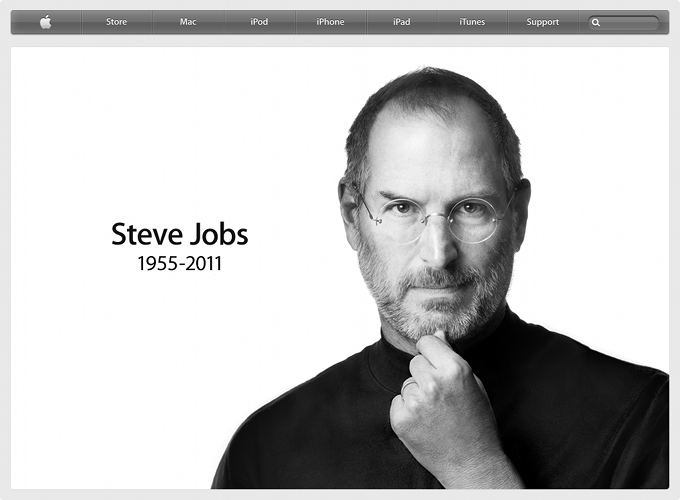In Memoriam Steve Jobs
In memory of Steve Jobs I wanted to share a link with the story of how rounded corners made their way into software.  Of course, thanks to Steve Jobs.
I grabbed this screenshot from the Apple website when the news broke about his death. Â I'm honoring him the only way I know how... Â I made sure to crop this image perfectly, and please note the small rounded corners :-)
RIP Oct 05, 2011
Keyword tags: Steve Jobsrounded corners
Facebook Facial Recognition Tool Is Good For Online Privacy
I'm a fairly private person. Â I don't mind posting and sharing online, but I get upset when private data is being leaked without my knowledge or intervention. Â For these reasons I shunned Facebook for years -- that is, until last year when Facebook revamped their privacy controls.
Even though Facebook still gets a lot of flack for not going far enough with their user controls, I live by the rule, if I don't want it online I don't share it -- and I make extensive use of groups to control how what I do post is shared. Â Yes, this still requires a fair amount is trust in Facebook, but the advantage of being able to keep in touch with family and friends is a feature I like to have.
The scary part about Facebook is the part I'm not in control of, my Facebook Friends. Â Unfortunately, there is little I can do when friends share my personal information or pictures online. Â I always cringe every time a see a friend "Answered a question about me!", and because I don't use ANY Facebooks apps I never really know what information was shared. Â (BTW - I think Facebook apps are a vast privacy invasion -- it's probably best to not use them and live without the knowledge of what superhero you are most like.)
Posted: Jun 10, 2011
Keyword tags: facebookprivacy
Android Could Overtake Windows in 2016
The past decade has included many wins for Linux and OSS, but 2010 has perhaps been the biggest year so far. Â The latest proof is the year end 2010 smartphone sales numbers, showing Android overtaking Symbian for the top slot in terms of OS share. Â This large growth got me wondering when we might see Linux powered devices overtake Windows-based PC's (desktops, laptops, netbooks, etc.)?
First, let's take a look where we are at today. Â Based on some IDC market reports, it looks like there has been around 321 million PC's sold worldwide in 2010. Â This number includes desktops, large portables (e.g. laptops), and small portables (e.g. netbooks). Â We are also looking at a PC growth rate worldwide of around 10%, dipping slightly as the years move forward. Â In North America PC growth is even worse, generally forcasted between -1% to 1% over the next several years. Â There isn't great way to determine what share of PC's run some version of Microsoft Windows, so I will assume 90% do.
Smartphone sales on the other hand are surging.  According to the latest Canalys numbers, 2010 saw around 101 million smartphones sold worldwide, with around 33% of them being powered by Android (a.k.a. Linux).  Android saw around an 615% growth rate in 2010, and Google is expected to double their lead over competition next year.
With numbers like this, it gets fun to play with some spreadsheets and try to predict what the world might look like in a few years. Â I will look at two hypothetical scenarios. Â The first will be if PC and smartphone growth remains exactly the same as it was in 2010, and the second, if we make some predictions on what market growth might look like over the next several years.
Posted: Feb 03, 2011
Keyword tags: androidwindowslinuxmobileOS warsmartphonetabletsfuture
The Path To Ubiquitous Desktop Linux: Kill the Desktop & Resurrect It
Last January I traveled to Las Vegas to attend CES, as part of my work at Kiddix. Â I found the event to be an exciting and exhausting 36 hours (a flight and one night in the Circus Circus was all my shoestring startup budget could afford). Â I had hoped to return again for the 2011 CES, but other obligations kept me away this year. Â Fortunately for me there weren't many earth shattering announcements -- but as expected, almost every hardware manufacturer, OEM, and ODM had a row of Android or vanilla Linux tablets to demo.
As non-earth-shattering as yet-another-tablet might seem, it shows in big spotlights the trend away from Microsoft-based computing.  CNET had a great CES wrap up article titled At CES, Android's rise, Windows' demise, which paints a good picture of what is an industry transition building for many years.
Posted: Jan 12, 2011
Keyword tags: linuxdesktop linuxandroidtabletssmartphoneOS warfuture
Recent Posts:
Popular Posts:
Recent Security Posts:
S3 Buckets: Now With Both Leak & Fill Vulnerability
Stealing Data With CSS: Attack and Defense
Move Over S3: Open Directory Indexes Continue to be a Problem
Security Researchers Lose a Favorite DNS Recon Tool Jan 2018
KRACK: How To Protect Yourself on a Flawed Network
Equifax, SEC, & Now Deloitte: Organizations Must Employ Offensive Security

